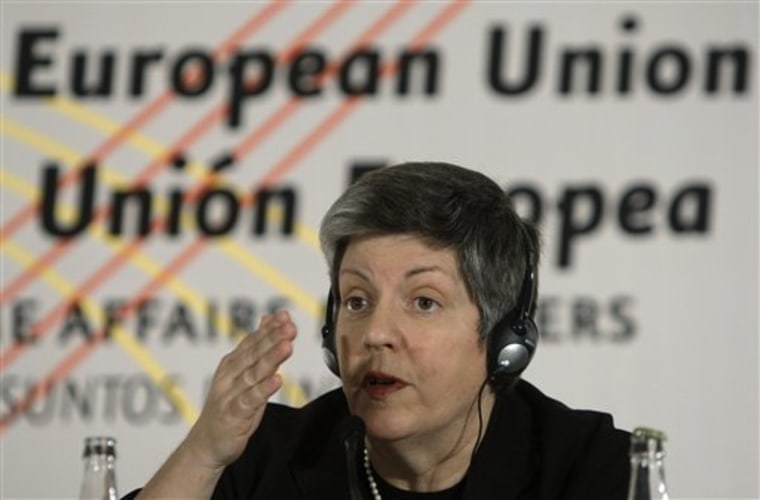The United States does not want countries to use identical airport security systems which could make it easier for potential attackers to elude them, U.S. Homeland Security Secretary Janet Napolitano said on Friday.
"What we want to avoid is a 'cookie cutter' approach, because then the terrorists know about the approach and they plan around it," Napolitano said during a visit to Europe to discuss tightening airport security.
"There is a whole mix of technology and practices that can be done at airports independently of scanners and this is what we are focused on as an international consensus," the Security Secretary said.
U.S. use of full body scanning has increased in the wake of a failed bombing attempt last month on a U.S. passenger jet, though some European countries are reticent to introduce technology that could violate privacy.
On Thursday, Napolitano sought to allay those concerns, saying that as the technology develops the devices will be less intrusive.
"Some of the privacy issues that have been raised are dealt with effectively by the new iterations of the technology," Napolitano told a press conference after meeting with EU interior ministers.
She denied the U.S. was pressuring Europe to deploy the scanners. "These meetings were not about the U.S. requiring anything," she said. The meeting did not deal with scanners specifically but rather with broader issues on advancing aviation security, she said.
But she stressed that better screening technology was one of several important elements for protecting travelers from terrorism.
Al-Qaida "is using its best minds against the international aviation system," she said. "We must do no less."
Europe seeks common position
Alfredo Perez Rubalcaba, Interior Minister for Spain, which holds the rotating EU presidency, said the EU needed to reach a common position on scanners.
"This is a debate that we have to carry out in Europe," Rubalcaba told the press conference. "It is reasonable that we address it not in a hurry but without delay either.
"What the failed attack in Detroit shows is that al-Qaida and its affiliates move," he added. "They try to dodge our security system. It's clear that they are seeking this and we have to be faster."
Spain and Germany are among the countries that have expressed reservations about scanners. Britain, the Netherlands, Italy and France have said they will either start installing them, add more or use them on a trial basis.
Italy will buy 15 body scanners for airport security, the Italian news agency ANSA quoted Interior Minister Roberto Maroni as saying in Toledo.
In the failed Christmas bombing attempt, U.S. authorities say a young Nigerian named Umar Farouk Abdulmutallab tried to detonate a bomb hidden in his underwear during a flight from Amsterdam to Detroit.
The idea is that a full-body scanner, which can provide images of what is under people's clothing, might have headed off the attack.
Thursday's meeting came a day after another airport scare, this time in Germany.
Munich airport breach
Part of Munich airport was closed Wednesday as officials searched in vain for a man who left a security checkpoint with a bag containing a laptop after it had triggered an alert for possible explosives.
The incident appeared to have been a false alarm triggered by a passenger who was in a hurry to catch his plane and was unaware of what had happened.
The ministers also urged the European Commission to speed up a plan to implement a Passenger Name Record process under which passenger details are forwarded to authorities in the destination country before the flights.
A Passenger Name Record accord between the United States and the EU has been in effect since 2007.
